-
Search -
Accessibility -
Members Login
The “Humanitarian Reform” describes systems introduced by the UN in 2005 to improve the effectiveness, timeliness and predictability of humanitarian response. Funding, coordination, leadership, partnership and accountability are the interlinked and mutually reinforcing elements that make up the reform process. NGOs have responded to the reforms in a variety of ways, including through engaging with the NHRP I and NHRP II.
Below are links for further information about the NGOs Humanitarian Reform Projects Phase I and II:
The project operated in Afghanistan, Democratic Republic of Congo, Ethiopia, Sudan and Zimbabwe – and aimed to strengthen the engagement of national and international NGOs in reformed humanitarian financing and coordination mechanisms. The project also produced evidence based best practices in humanitarian reform and these were disseminated widely and contributed to an improved understanding of humanitarian reform amongst NGOs in project focus countries and beyond.
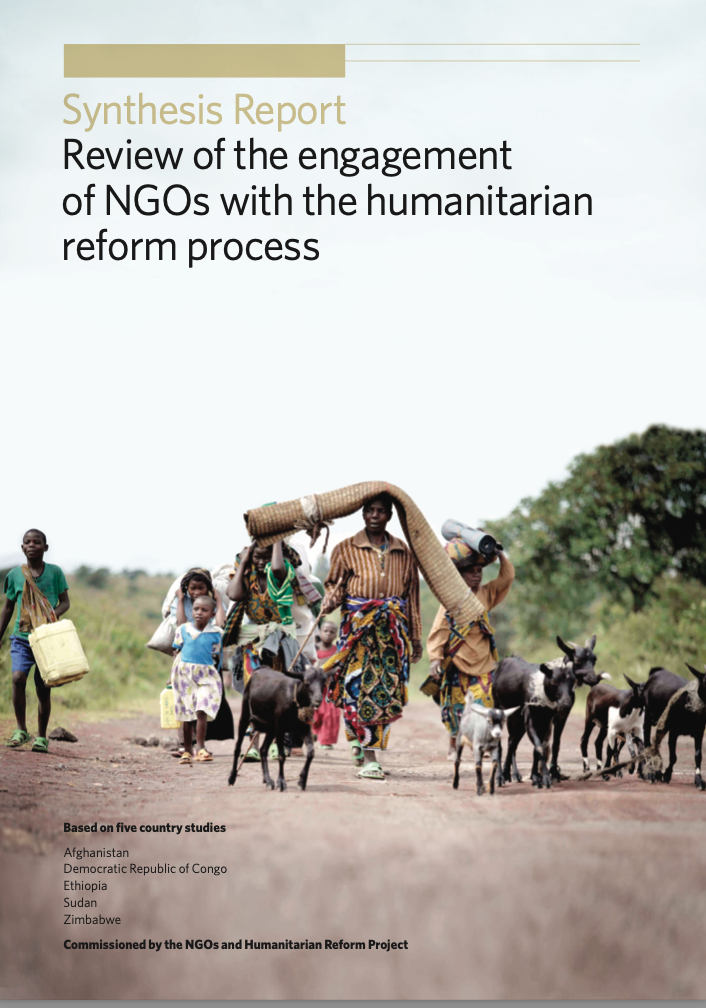
This report analyses the current state of global humanitarian reform efforts from an NGO perspective by synthesising a series of mapping studies carried out between November 2008 and February 2009 that looked at humanitarian reform in five different countries: Afghanistan, the Democratic Republic of Congo, Ethiopia, Sudan and Zimbabwe. Lessons from other contexts are also brought in to strengthen the analysis and provide an overview of humanitarian reform.
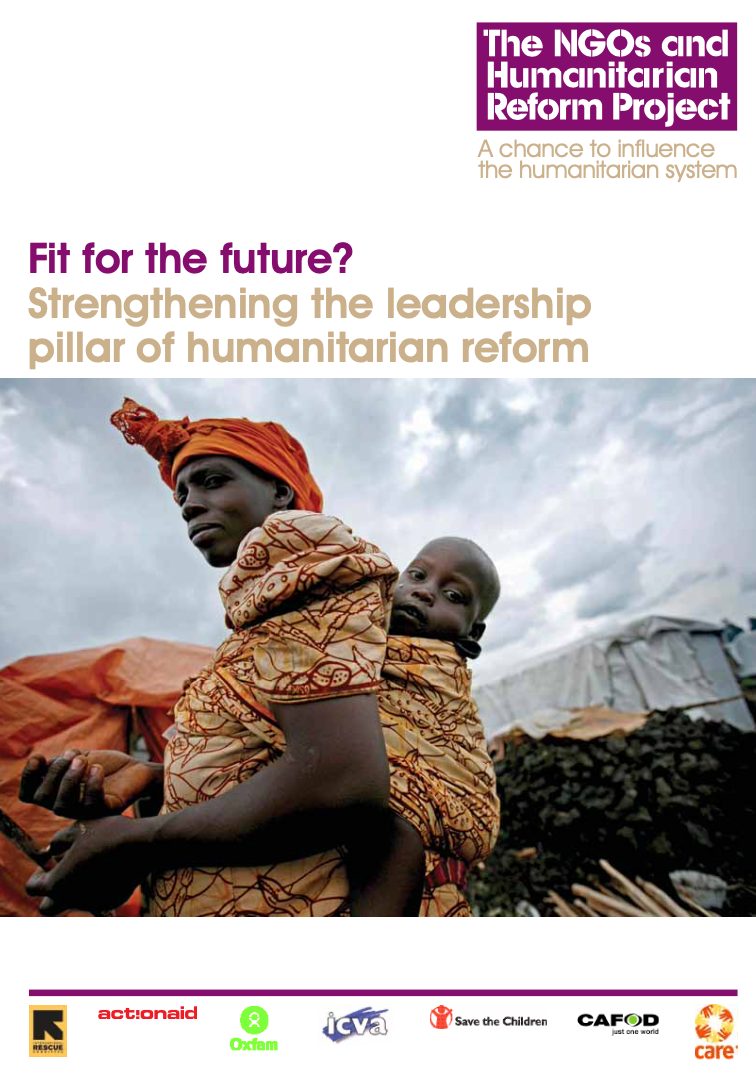
This paper reviews the steps taken to strengthen humanitarian leadership as a result of the humanitarian reforms first rolled out in 2005.
This research was commissioned by the NGOs and Humanitarian Reform Project (NHRPI).
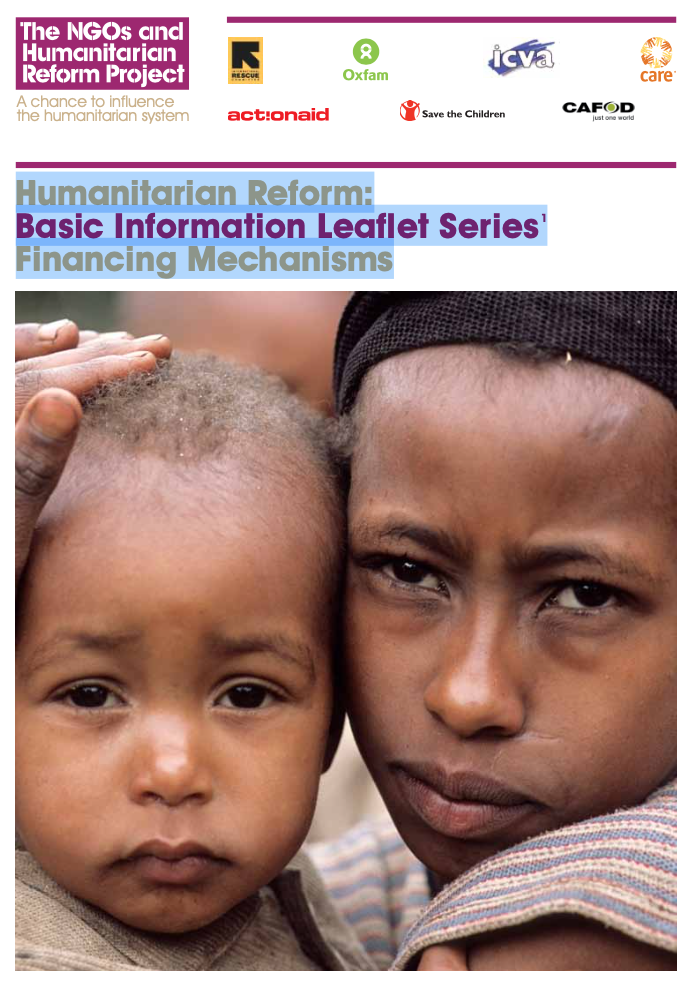
Basic Information leaflet series was part of the NGO and Humanitarian Reform Project – Phase 1 ( NHRP1)
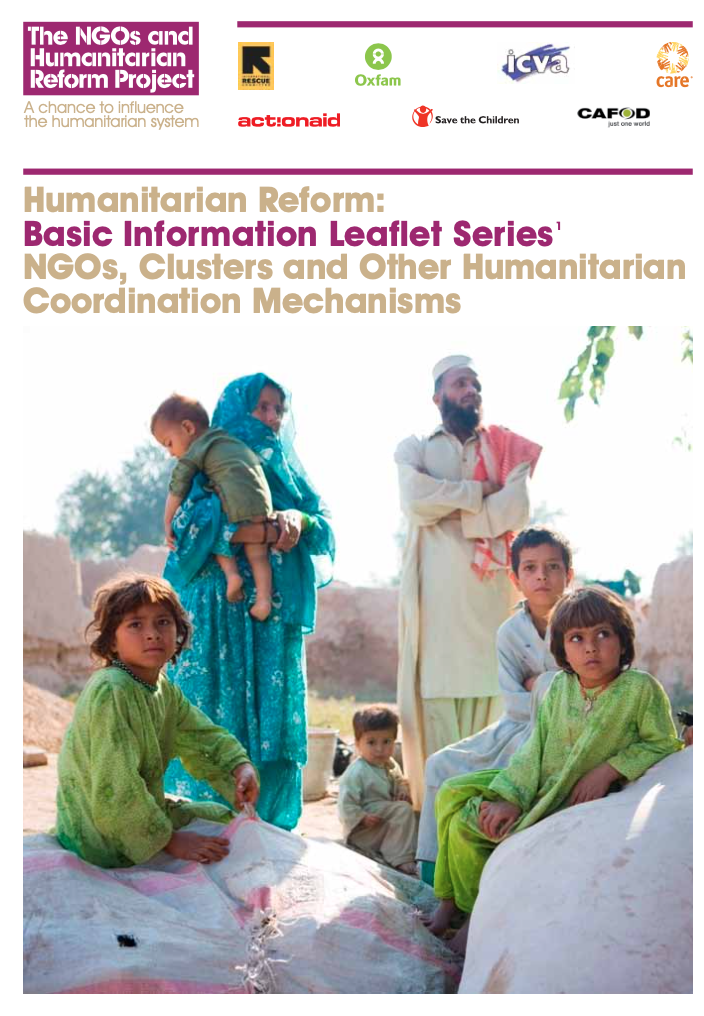
Basic Information leaflet series was part of the NGO and Humanitarian Reform Project – Phase 1 ( NHRP1)
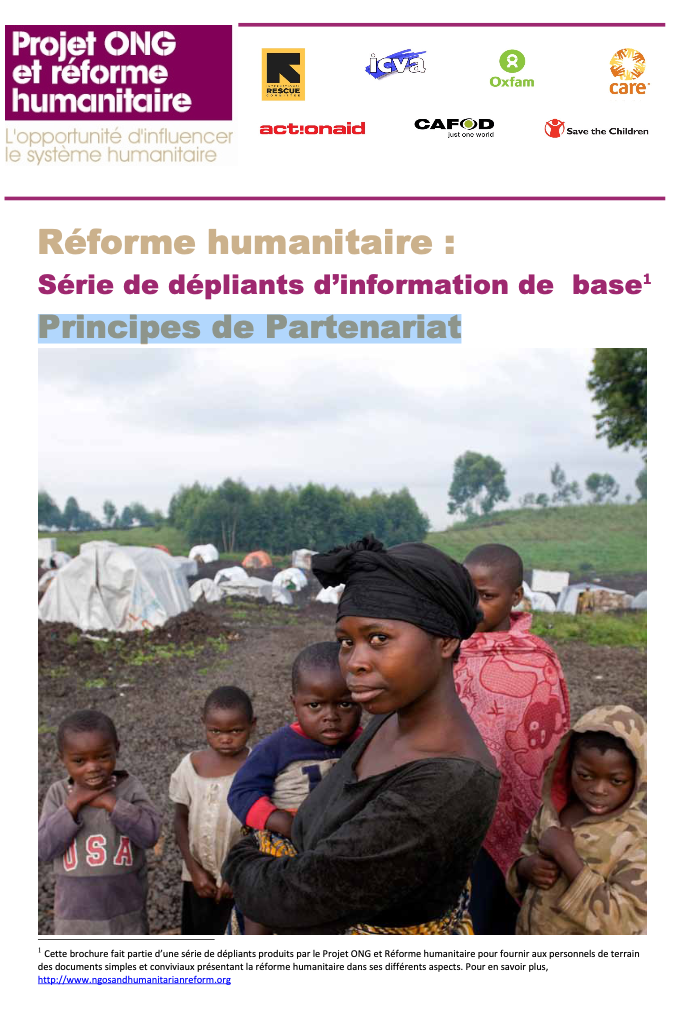
Basic Information leaflet series was part of the NGO and Humanitarian Reform Project – Phase 1 ( NHRP1)
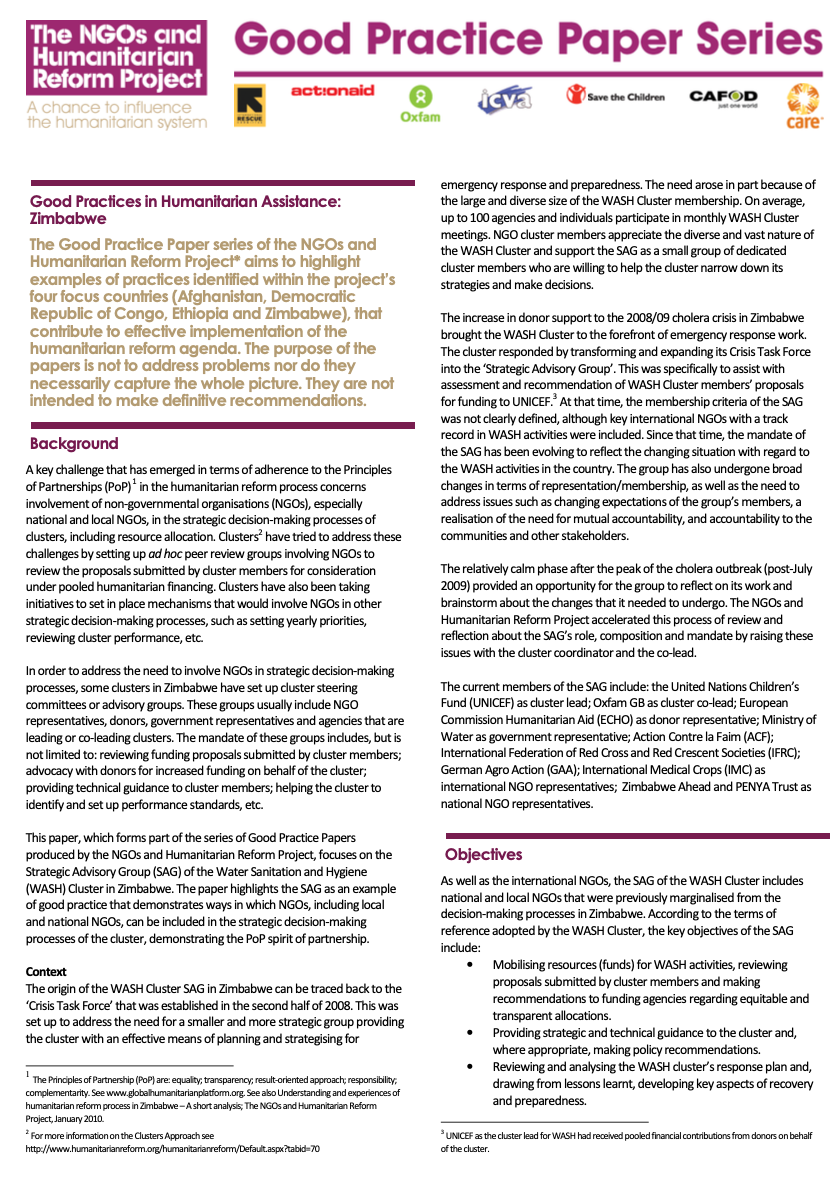
The Good Practice Paper series of the NGOs and Humanitarian Reform Project* aims to highlight examples of practices identified within the project’s four focus countries (Afghanistan, Democratic Republic of Congo, Ethiopia and Zimbabwe), that contribute to effective implementation of the humanitarian reform agenda. The purpose of the papers is not to address problems nor do they necessarily capture the whole picture. They are not intended to make definitive recommendations.
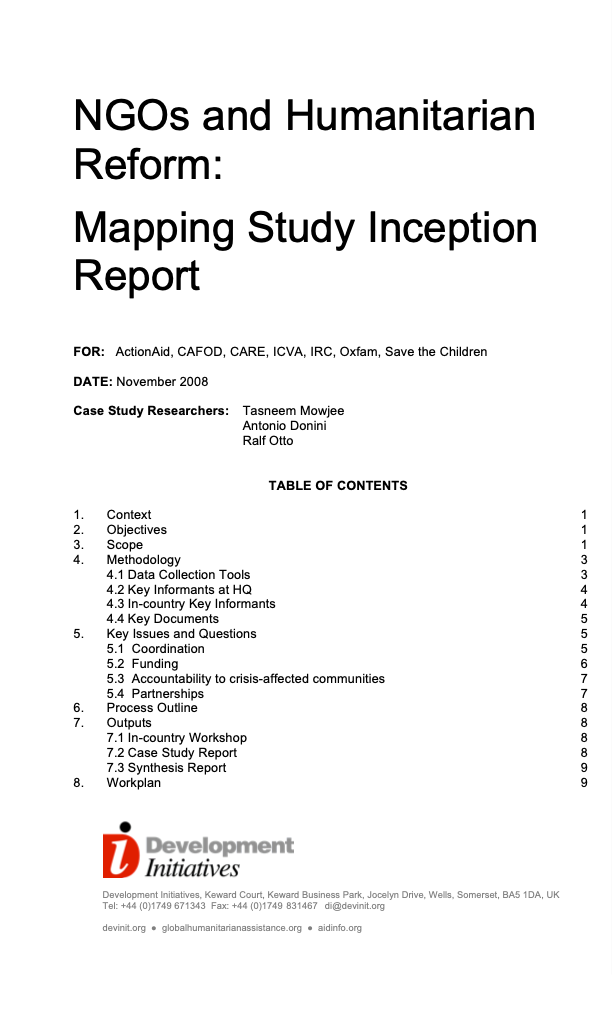
This mapping study is one of a series of five reports commissioned by the NGOs and Humanitarian Reform Project- Phase 1 : Inception report, Afghanistan, DRC, Ethiopia, Sudan and Zimbabwe.
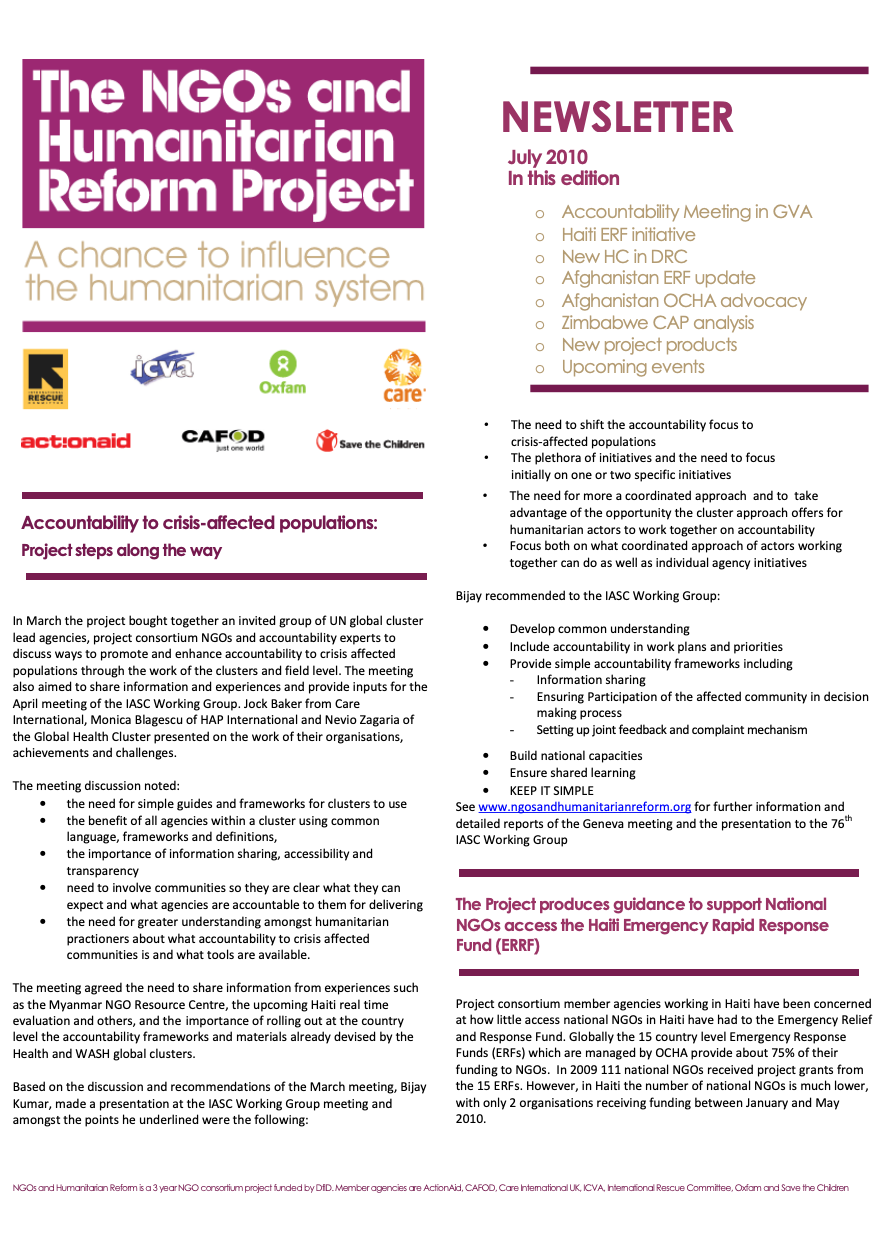
Newsletters from the NGOs and Humanitarian Reform Project Phase 1 (NHRP1)
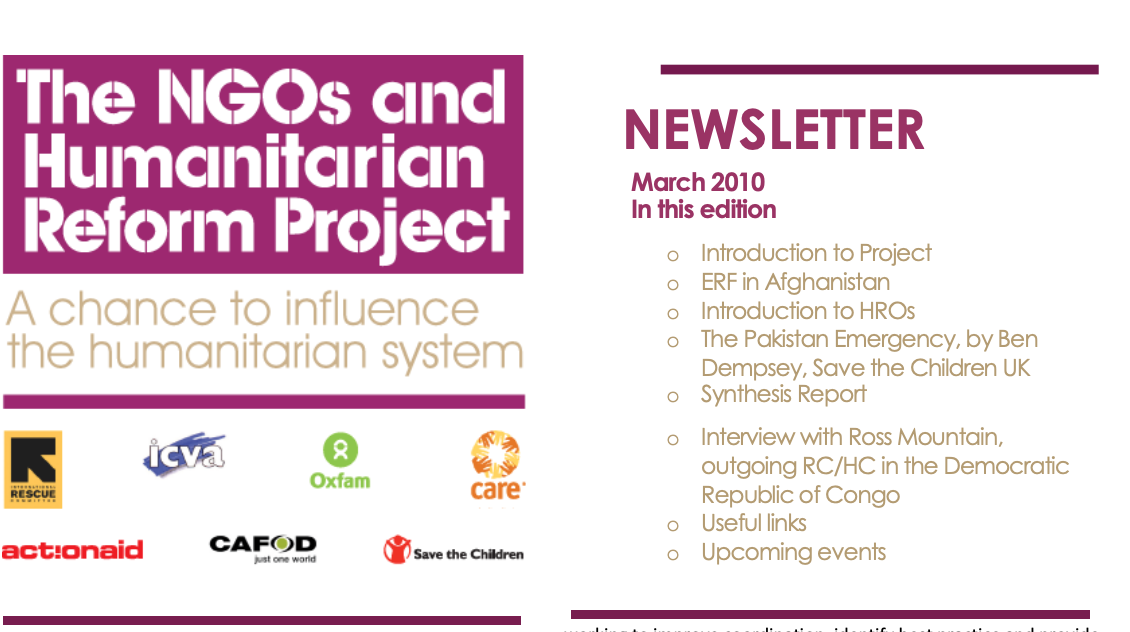
The NGOs and Humanitarian Reform Project aims to strengthen the effective engagement of local, national and international NGOs in reformed humanitarian financing and coordination mechanisms at global and country levels.
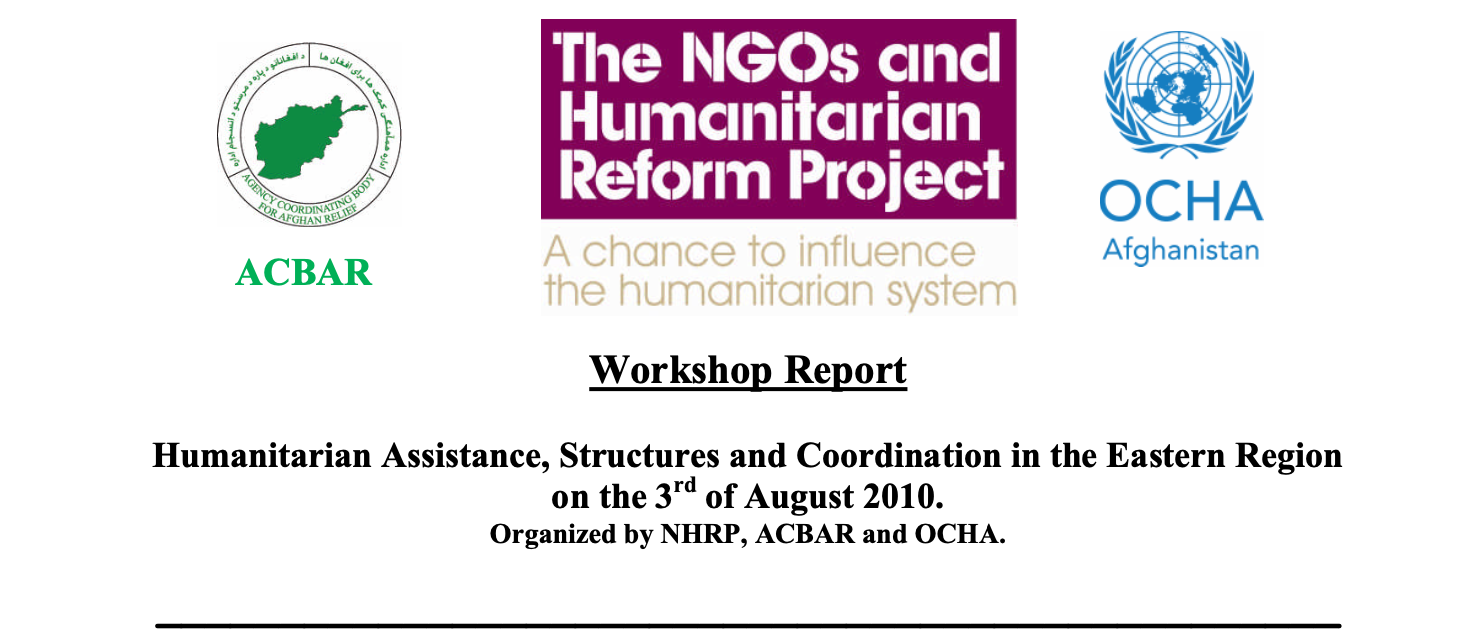
The NGO and the Humanitarian Reform Project Phase v1, in cooperation with ACBAR and OCHA held three workshops in Afghanistan humanitarian stakeholders. In July 2010 in the North of Afghanistan and in Western Region, and in August 2010 in the Eastern region.
The interactive discussion aimed to increase the humanitarian reform awareness in the region and the awareness on what recourses are available on the Kabul level in addition to the global level.
The workshop came up with practical suggestions and recommendations on improvements to the humanitarian response capacity in the Afghanistan.
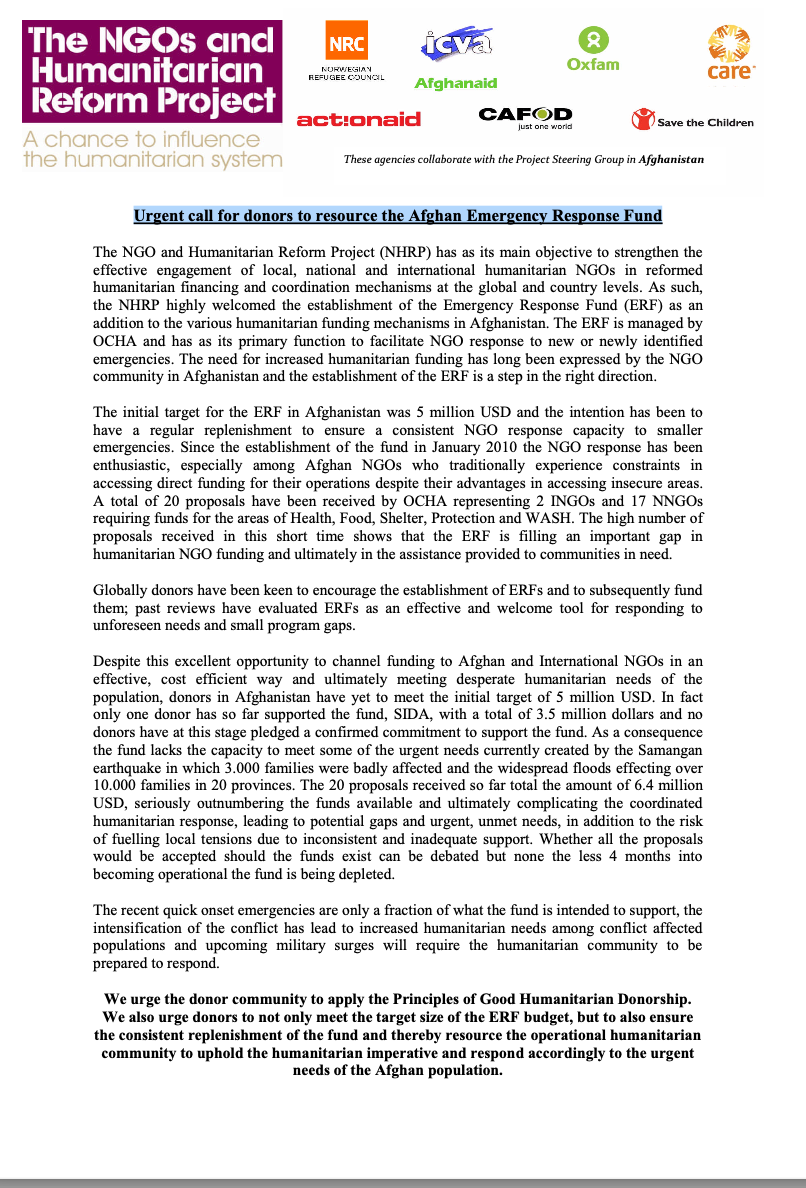
Poject report as part of NGOs and Humanitarian Reform Project Phase 1.
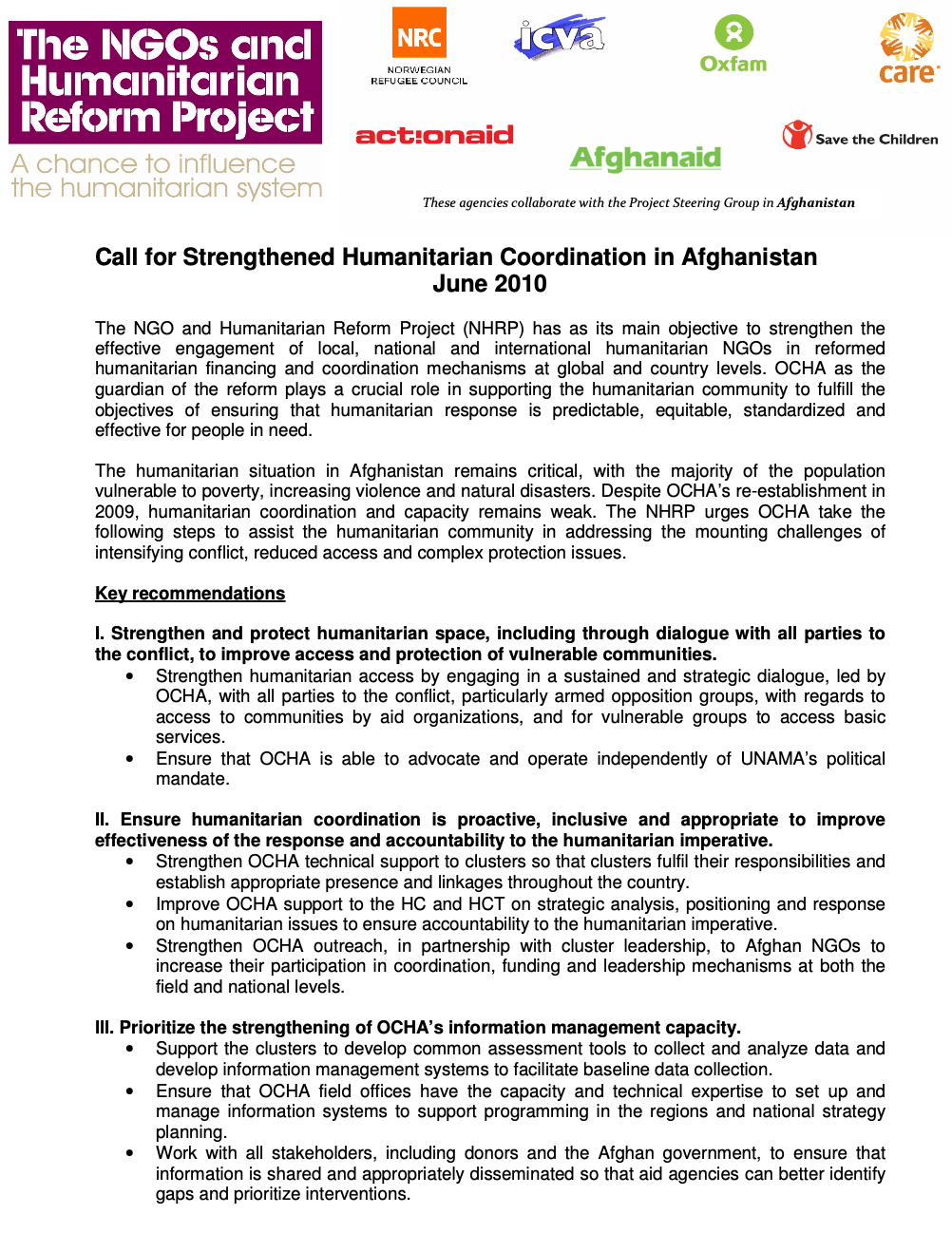
The NGO and Humanitarian Reform Project (NHRP1) has as its main objective to strengthen the effective engagement of local, national and international humanitarian NGOs in reformed humanitarian financing and coordination mechanisms at global and country levels. OCHA as the guardian of the reform plays a crucial role in supporting the humanitarian community to fulfill the objectives of ensuring that humanitarian response is predictable, equitable, standardized and effective for people in need.
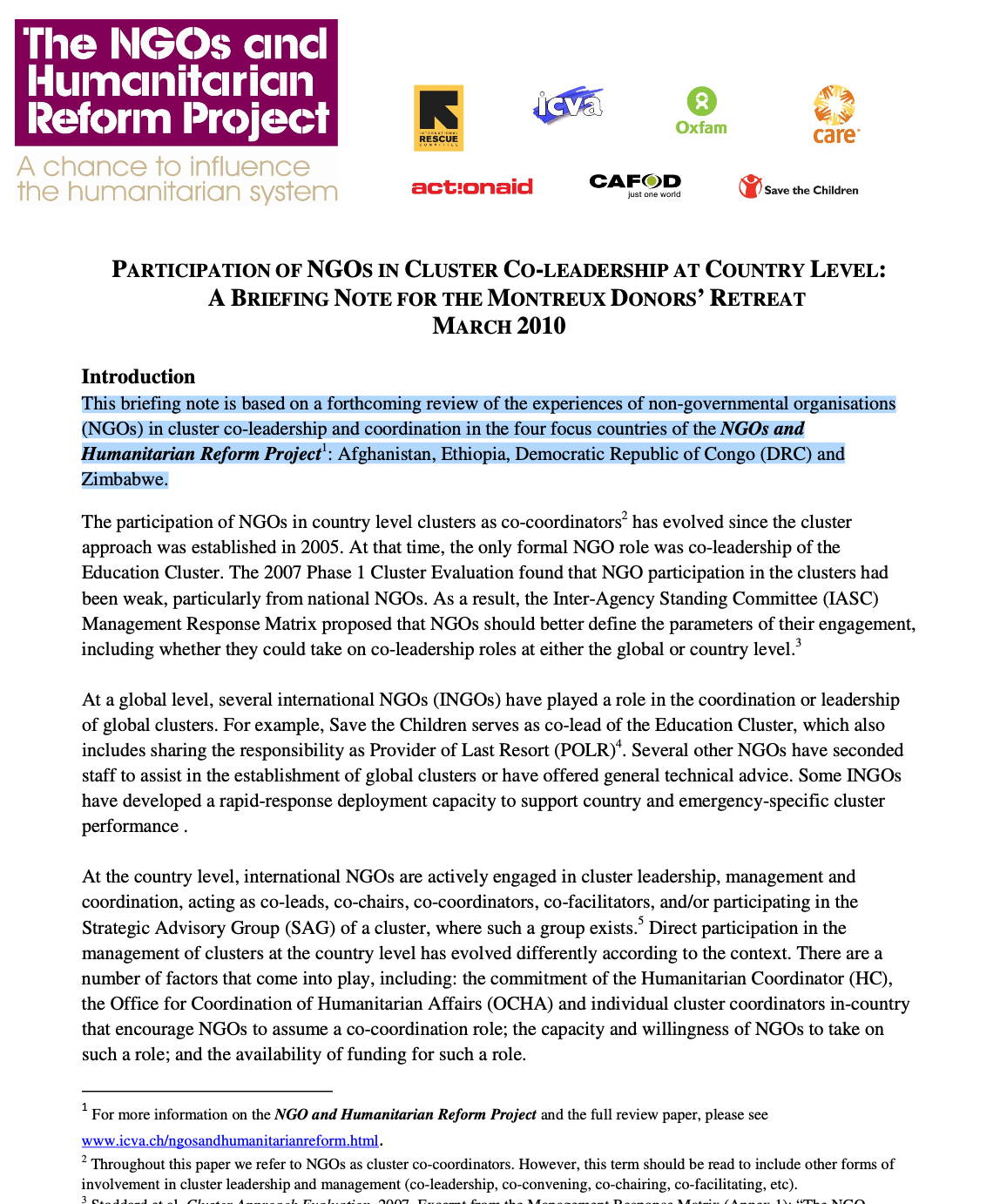
This briefing note is based on a forthcoming review of the experiences of non-governmental organisations (NGOs) in cluster co-leadership and coordination in the four focus countries of the NGOs and Humanitarian Reform Project1: Afghanistan, Ethiopia, Democratic Republic of Congo (DRC) and Zimbabwe.
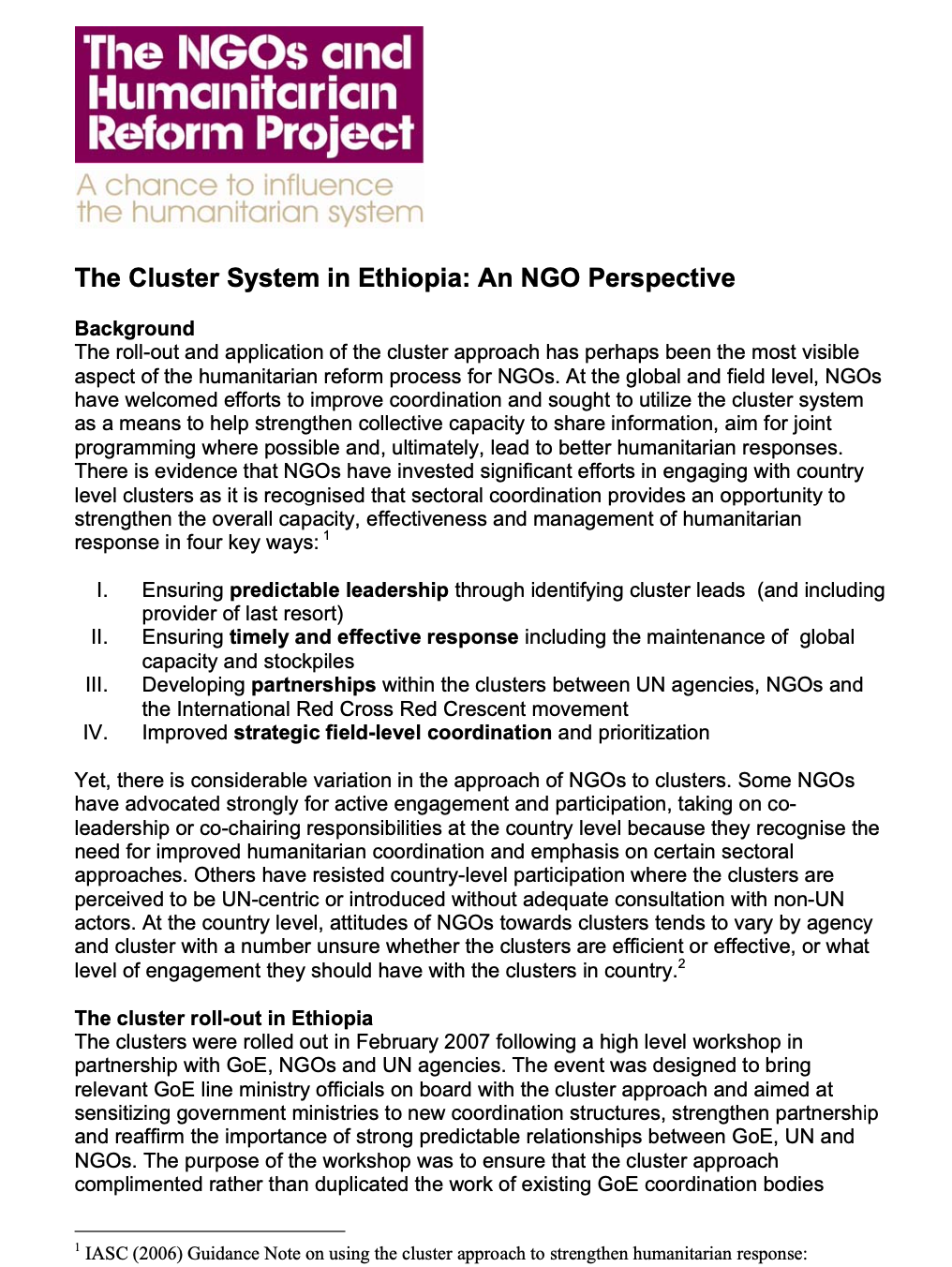
The roll-out and application of the cluster approach has perhaps been the most visible aspect of the humanitarian reform process for NGOs. At the global and field level, NGOs have welcomed efforts to improve coordination and sought to utilize the cluster system as a means to help strengthen collective capacity to share information, aim for joint programming where possible and, ultimately, lead to better humanitarian responses.
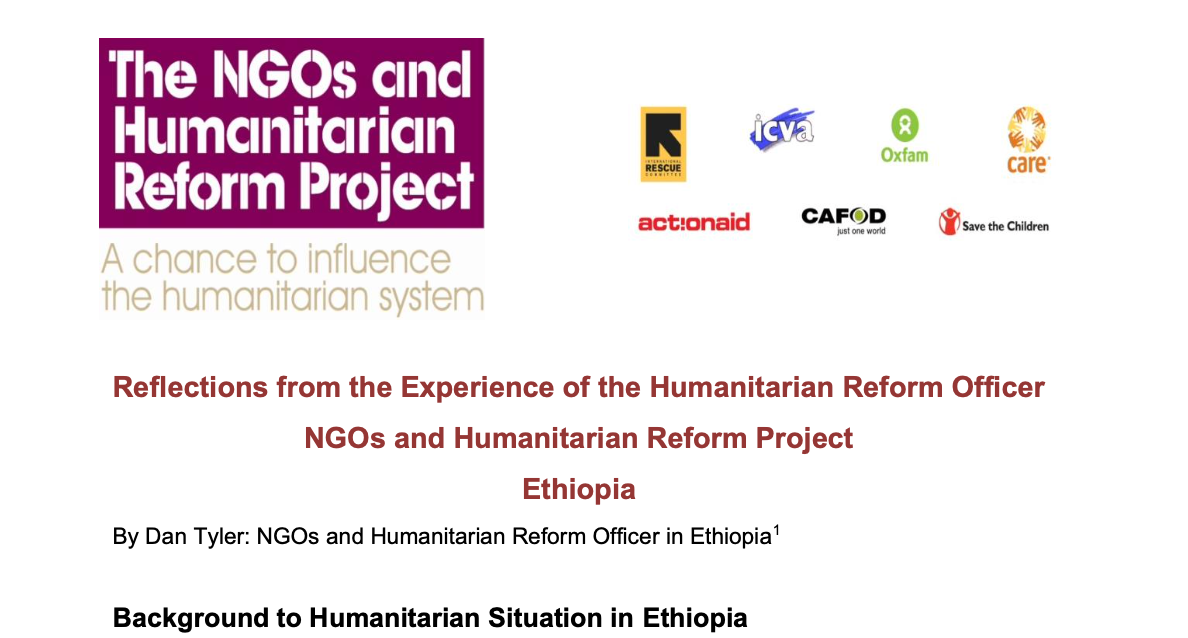
This document is part of the NGO and Humanitarian Reform Project Phase I
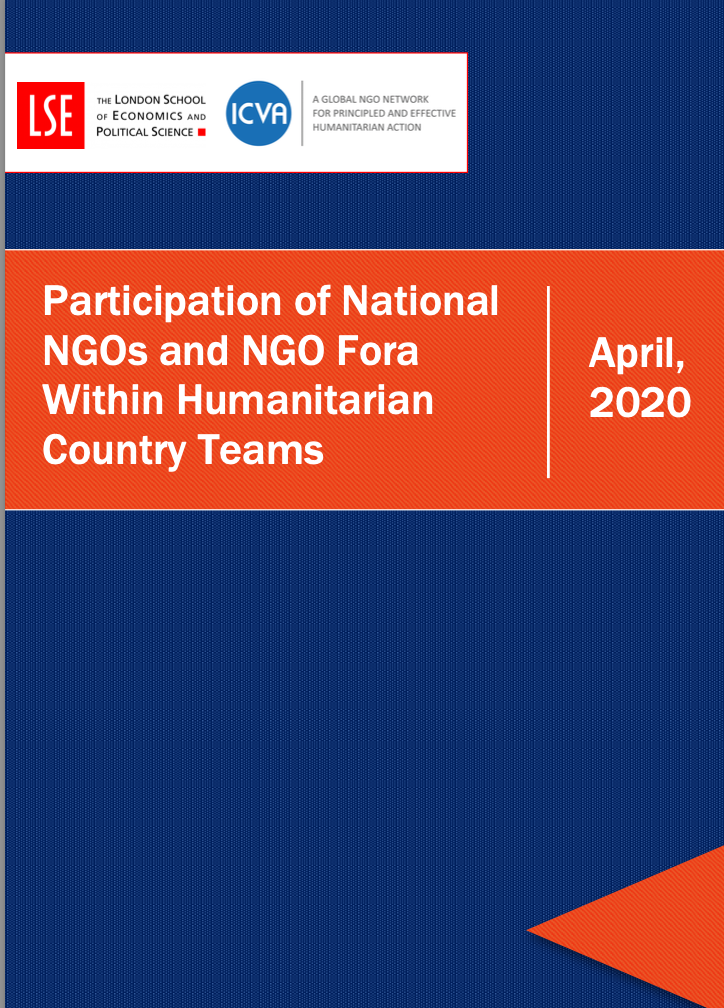
This report was commissioned by ICVA and carried out by a consultancy team from the London School of Economics. The research was conducted with the aim of exploring the quality of participation, as well as the challenges inhibiting meaningful participation, by NNGOs and NGO fora within Humanitarian Country Teams.
The NGOs humanitarian Reform Project Phase II actives focused on strengthening the role of national and International NGOs in coordinating and leading response. Building on the research and advocacy achievements of the first phase of the project, NHRP II supported NGOs, particularly local and national organisations, to improve humanitarian outcomes for communities affected by disasters and conflict.
The focus on enhancing NGO engagement in reformed humanitarian coordination, leadership, financial mechanisms, adherence to the Principles of Partnership, and promoting accountability to affected populations.
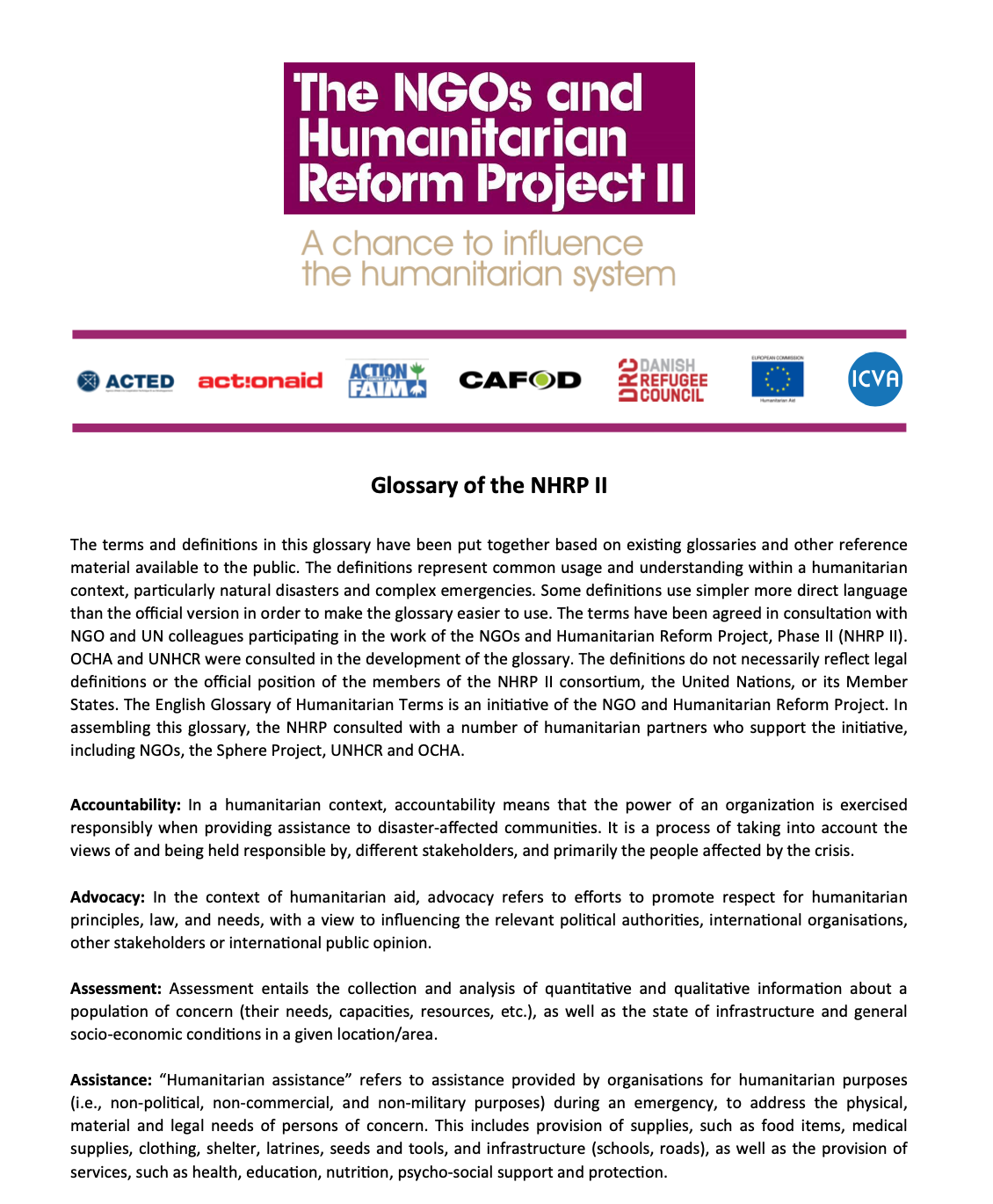
The terms and definions in this glossary have been put together based on existing glossaries and other reference material available to the public. The terms have been agreed in consulti.on with NGO and UN colleagues partcipating in the work of the NGOs and Humanitarian Reform Project, Phase II (NHRP II). OCHA and UNHCR were consulted in the development of the glossary.
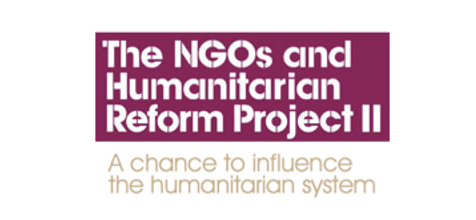
The first NGOs and Humanitarian Reform Project (NHRPI) ended prematurely in 2010 after a review of funding priorities by its donor, DFID. In January 2011, ICVA proposed a second project to ECHO. The aim of NHRPII was to improve humanitarian response through better NGO coordination and better engagement with international and national humanitarian coordination mechanisms.
NHRP II priorities were identified by the Steering Committee in five focus countries – Somalia, Ivory Coast, Pakistan, Sudan and Zimbabwe – based on the needs identified at the country level. The finding in the focus countries were used to influence global advocacy and policy discussion and learnings shared across countries to promote good practice particularly at local level.
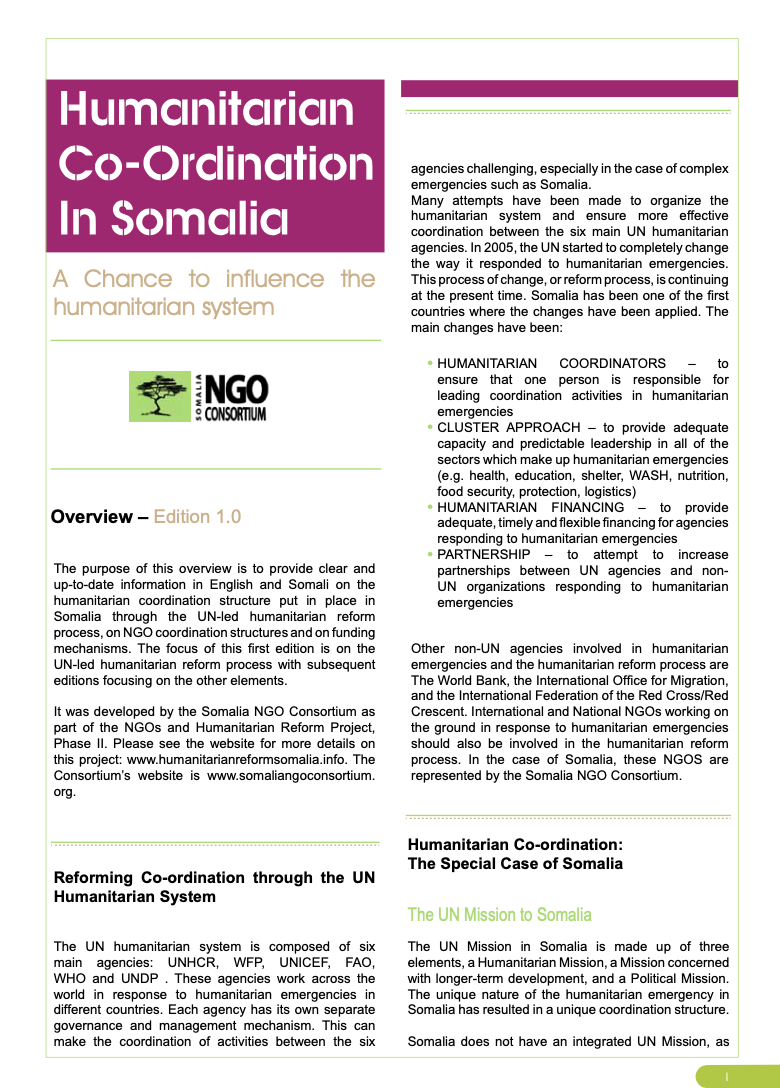
This overview is to provide clear and up-to-date information in English and Somali on the humanitarian coordination structure put in place in Somalia through the UN-led humanitarian reform process, on NGO coordination structures and on funding mechanisms in 2013.
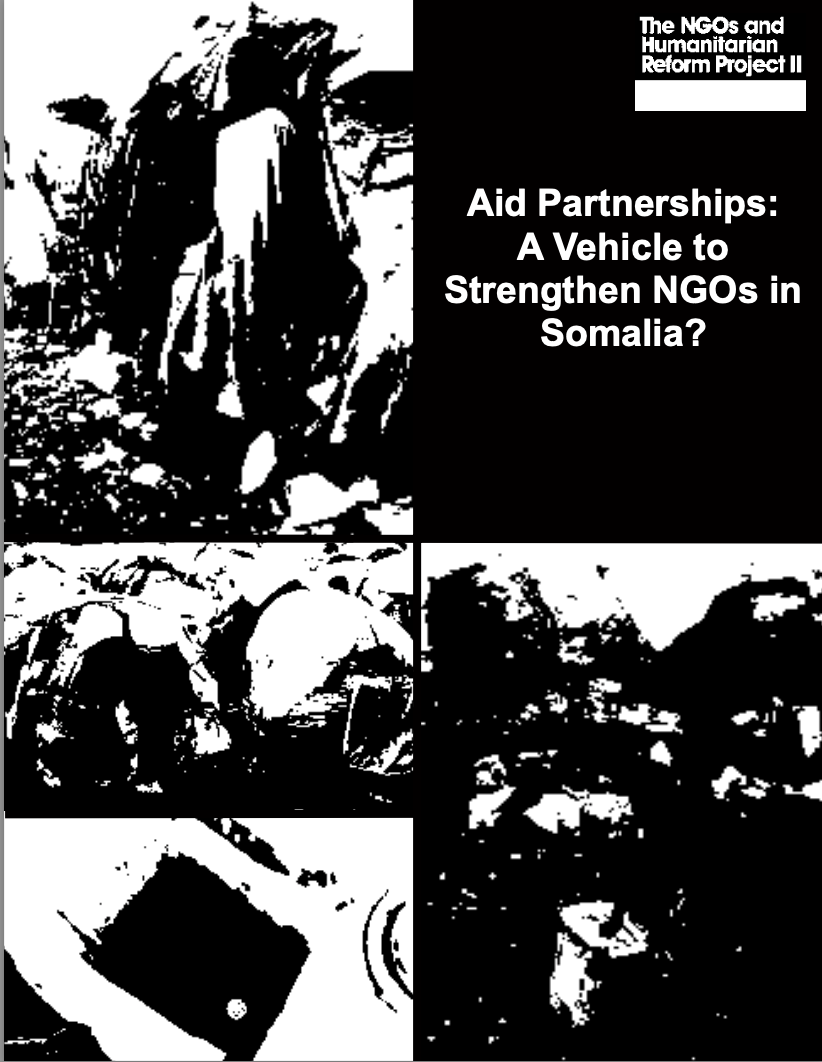
The protracted humanitarian crisis in Somalia combined with the growing insecurity and recent challenges of access to affected populations created strong reliance of international aid organisations on Somali NGOs for the delivery of humanitarian assistance. As a result, a large number of Somali NGOs (SNGOs) are working in partnership with international aid organisations (IAOs) and playing a more centre-stage role in humanitarian action than ever before.
Part of NGOs and Humanitarian Reform Project Phase II.
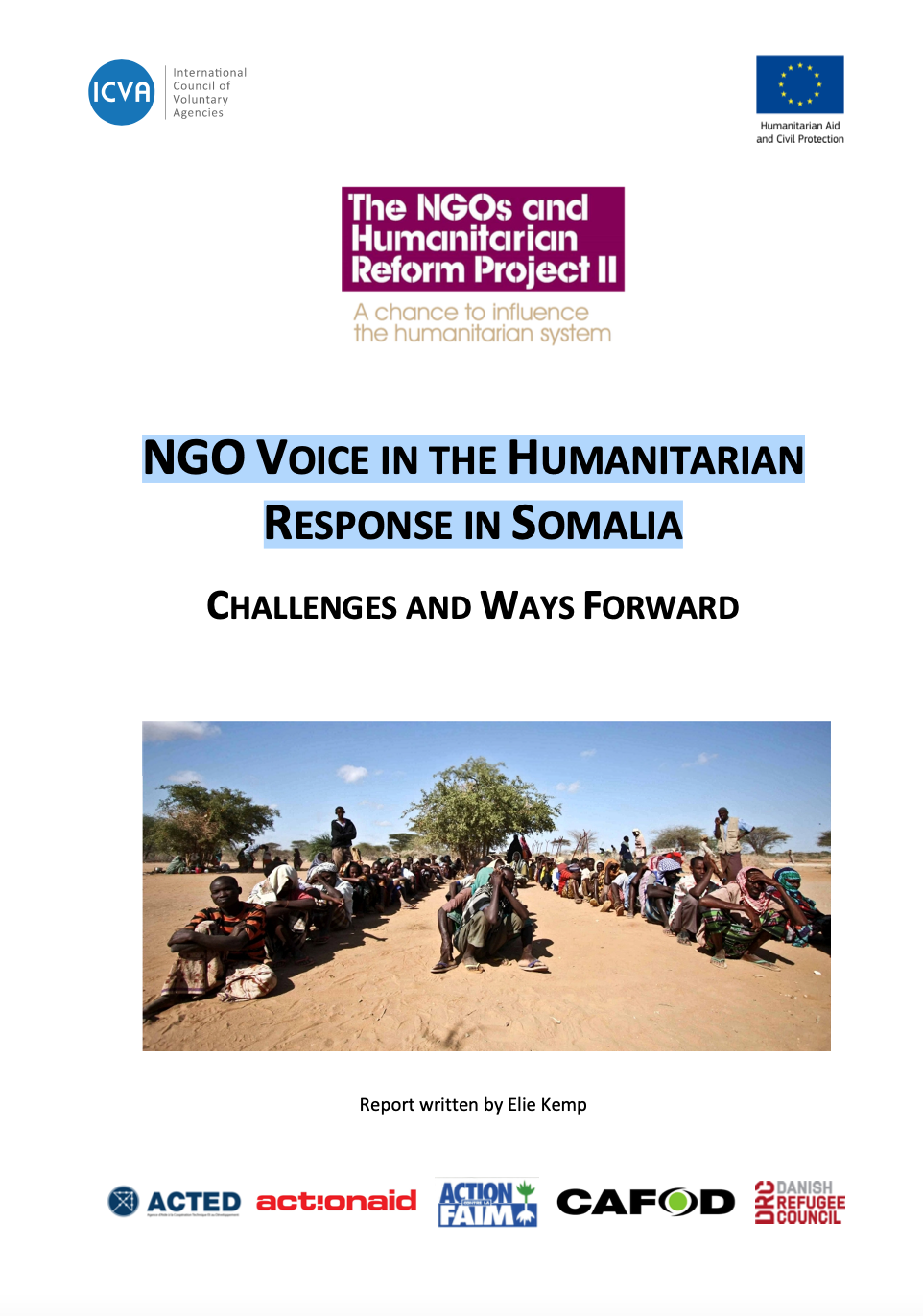
In the context of major changes in Somalia since 2012, non-governmental organisations (NGOs) are facing renewed challenges to their delivery of humanitarian assistance and to the humanitarian principles which underpin their intervention. Yet many feel their collective response to those challenges has lacked authority and impact in recent times.
The findings set out in this report are drawn from semi-structured interviews with 50 NGO senior and middle managers in Mogadishu, Hargeisa and Nairobi, plus 15 external stakeholders, between January and February 2013.
The research was financed through the NGOs and Humanitarian Reform Project Phase II on behalf of the Somalia NGO Consortium.
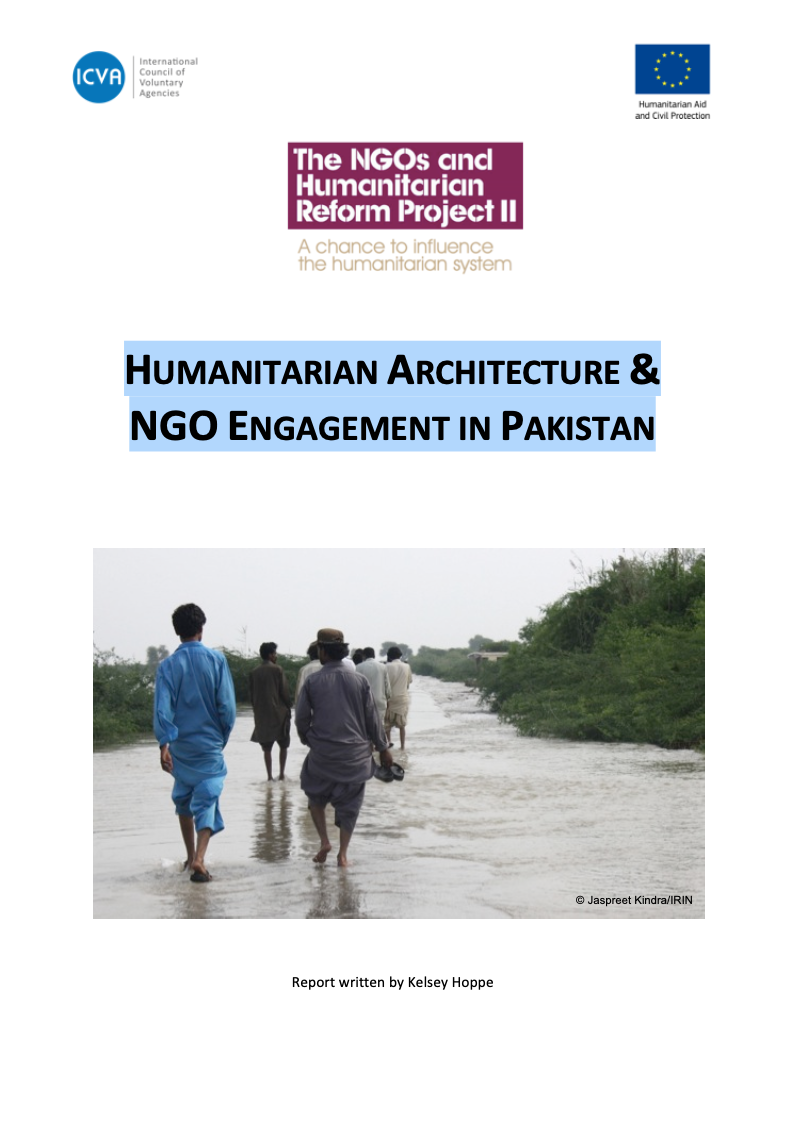
The NGOs Humanitarian Reform Project Phase II activities focus on strengthening the role of national and international NGOs in coordinating and leading response. Building on the research and advocacy achievements of the first phase of the project, NHRP II is supporting NGOs – particularly local and national organizations – to improve humanitarian outcomes for communities affected by disasters and conflict. The focus in on enhancing NGO engagement in reformed humanitarian coordination, leadership, financial mechanisms, adherence to the Principles of Partnership, and promoting accountability to affected populations.
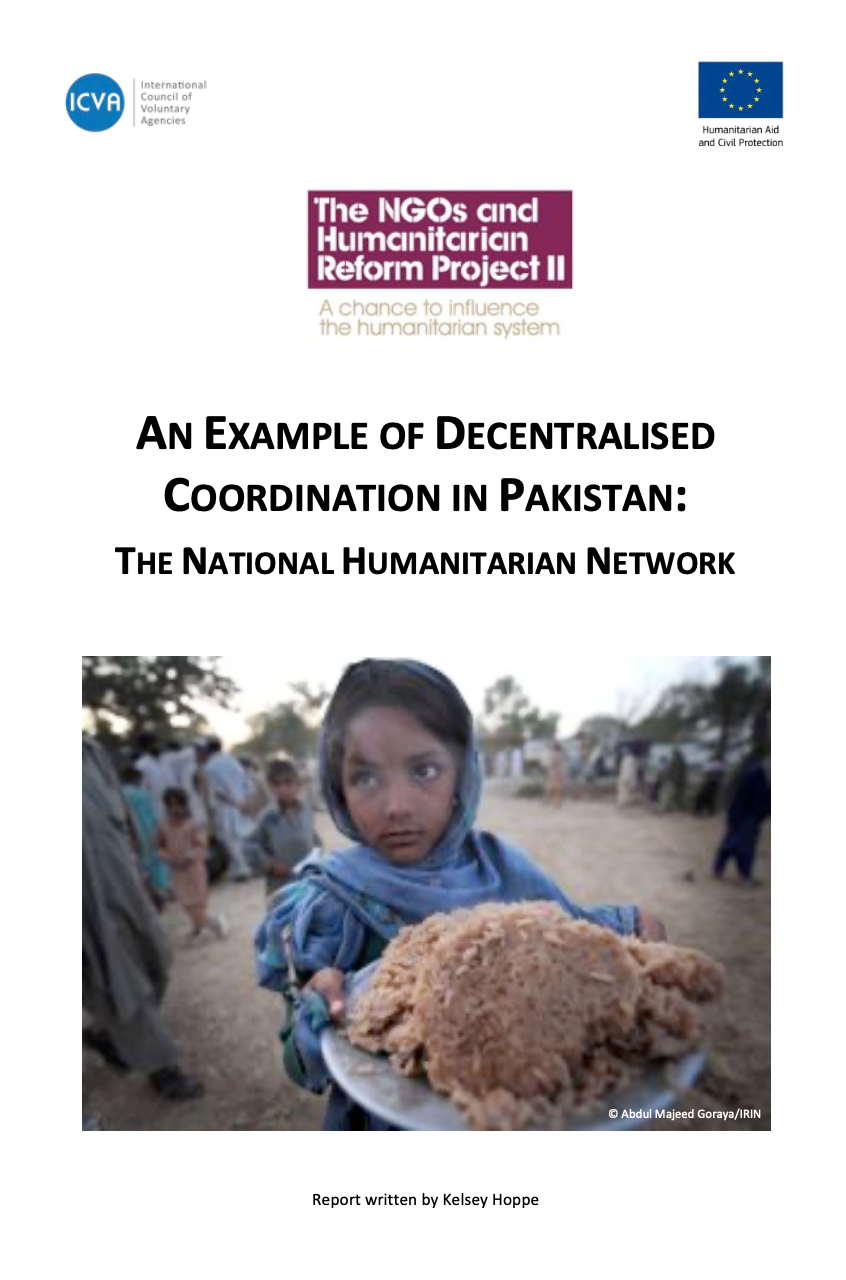
The NGOs Humanitarian Reform Project Phase II activities focus on strengthening the role of national and international NGOs in coordinating and leading response. Building on the research and advocacy achievements of the first phase of the project, NHRP II is supporting NGOs – particularly local and national organizations – to improve humanitarian outcomes for communities affected by disasters and conflict. The focus is on enhancing NGO engagement in reformed humanitarian coordination, leadership, financial mechanisms, adherence to the Principles of Partnership, and promoting accountability to affected populations.
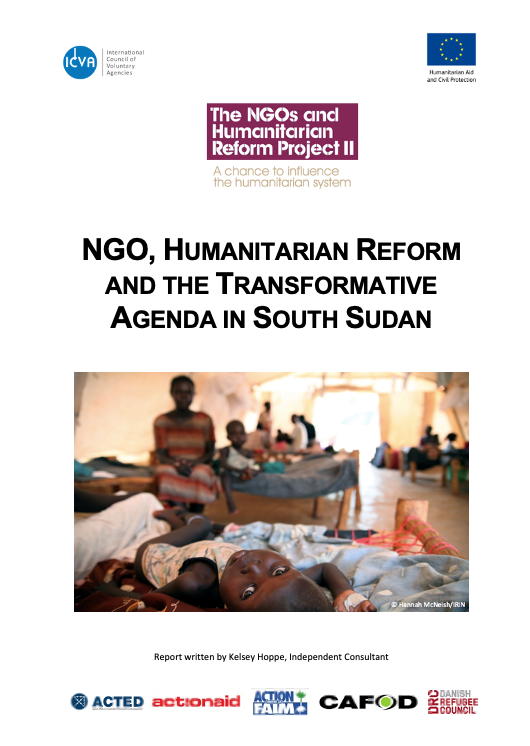
The NGOs Humanitarian Reform Project Phase II activities focus on strengthening the role of national and international NGOs in coordinating and leading response. Building on the research and advocacy achievements of the first phase of the project, NHRP II is supporting NGOs – particularly local and national organizations – to improve humanitarian outcomes for communities affected by disasters and conflict. The focus in on enhancing NGO engagement in reformed humanitarian coordination, leadership, financial mechanisms, adherence to the Principles of Partnership, and promoting accountability to affected populations.
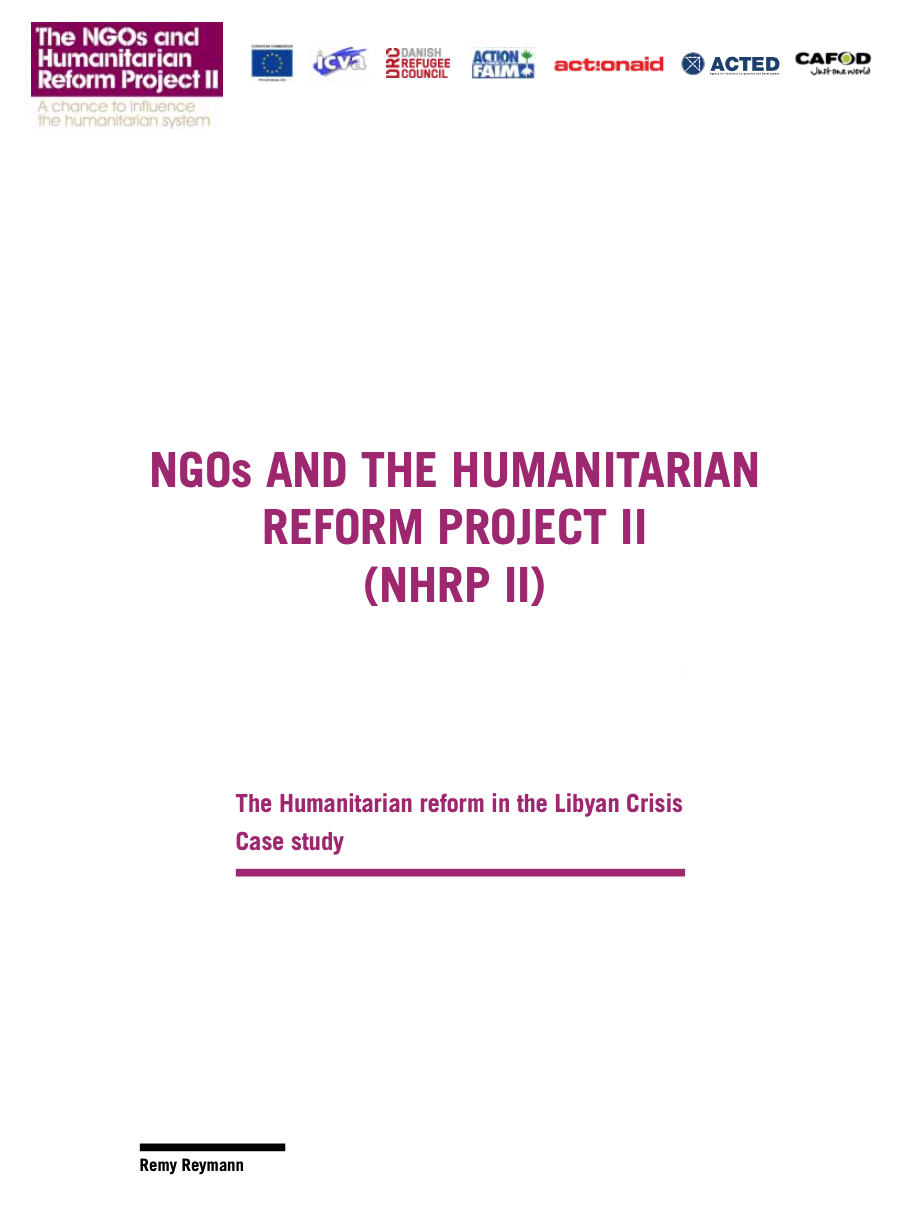
A case study from the NGOs and Humanitarian Reform Project Phase II.
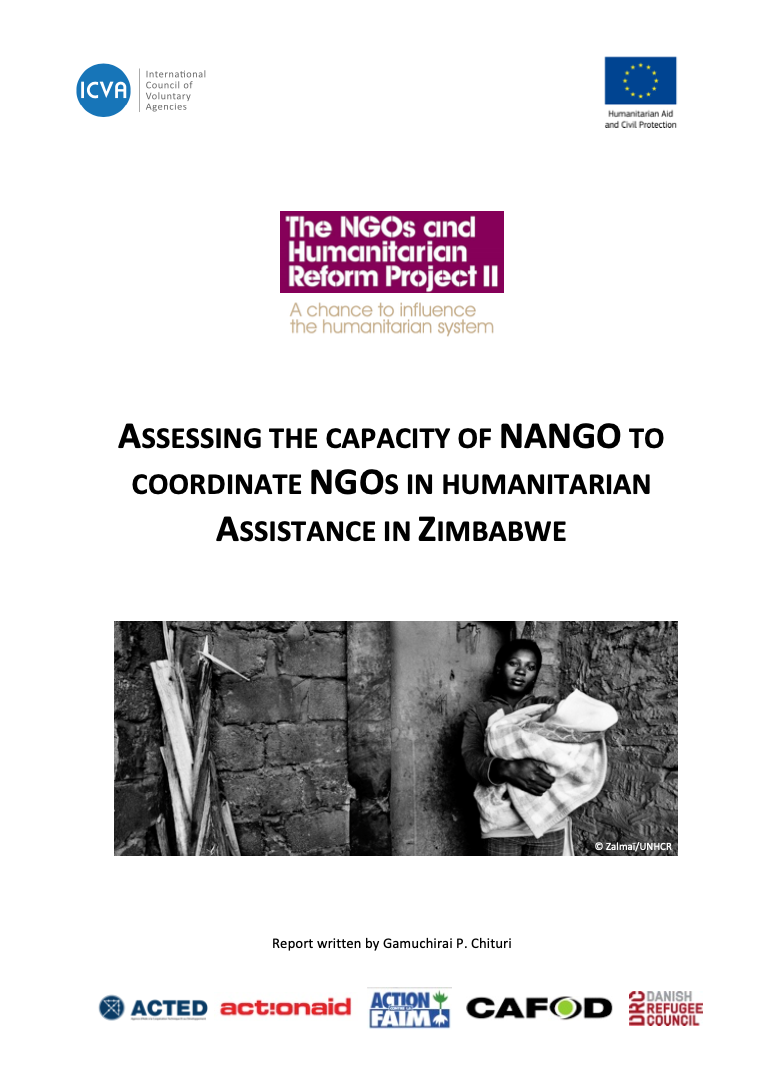
The NGO and Humanitarian Reform Project Phase II (NHRP II) aims to enhance the leadership, participation, and representation of NGOs in humanitarian reform structures through support for capacity and consensus building. To do so, the NHRP II will strengthen the capacity of NGOs to assume active membership and leadership roles in humanitarian reform forums and ensure that country-level challenges and good practices inform and advance global policy discussions on humanitarian reform.
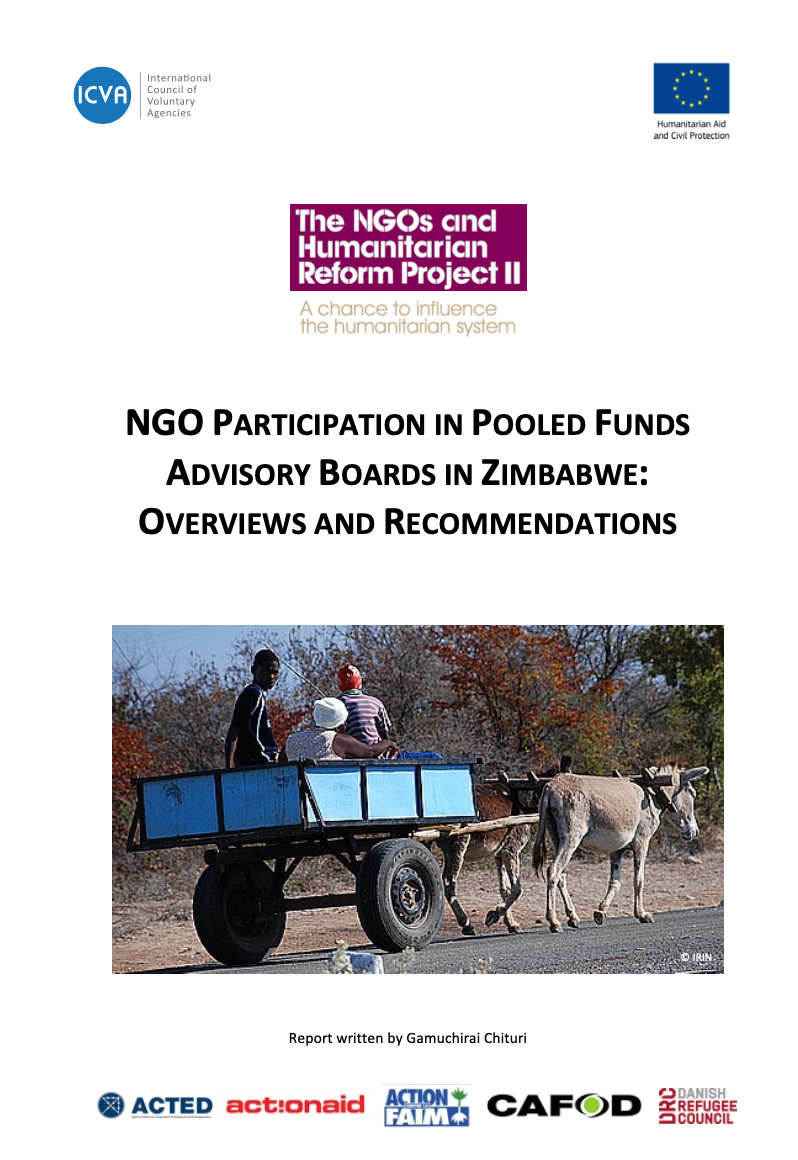
This Guidance document has been developed with the generous support of ActionAid under the Humanitarian Reform Phase II project.
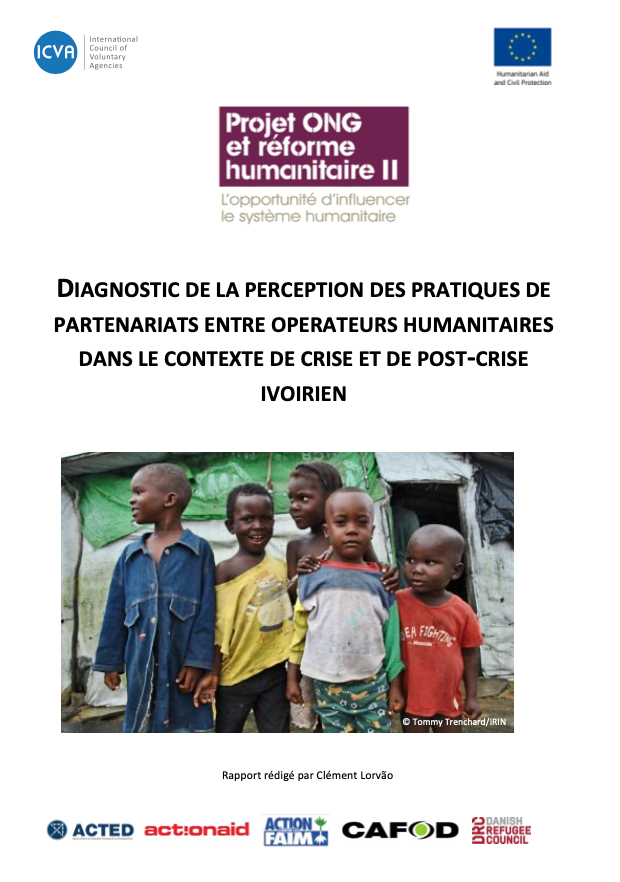
Document is part of the NGO and Humanitarian Reform Project Phase II.
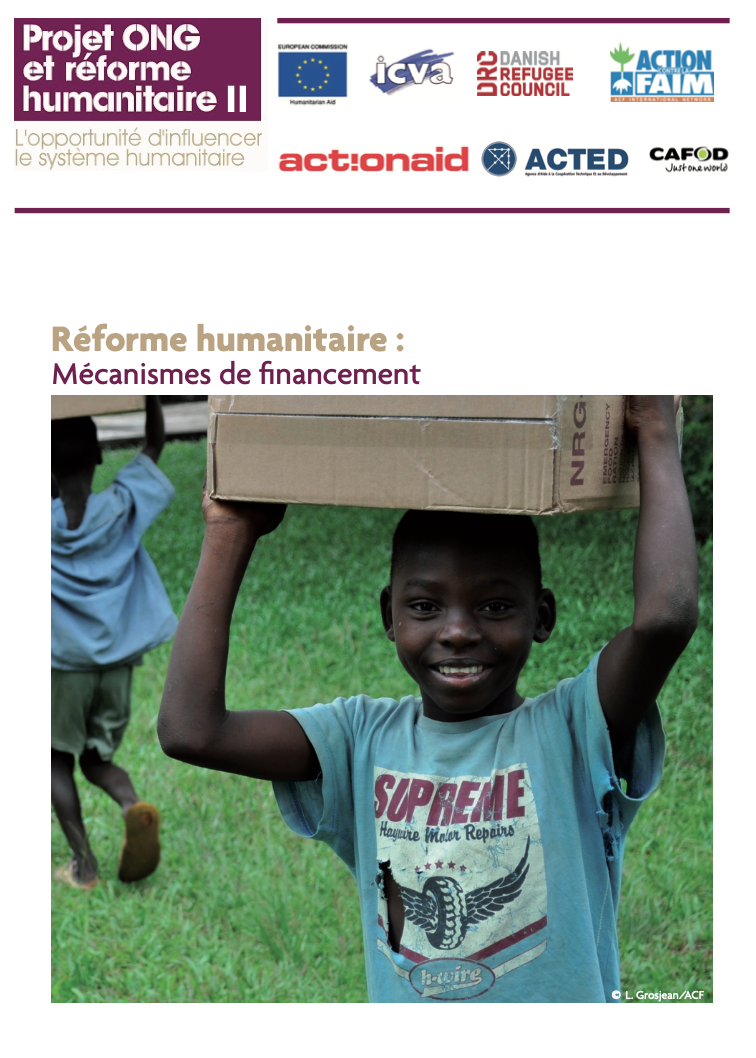
This document is part of the NGOs and Humanitarian Reform Project Phase II
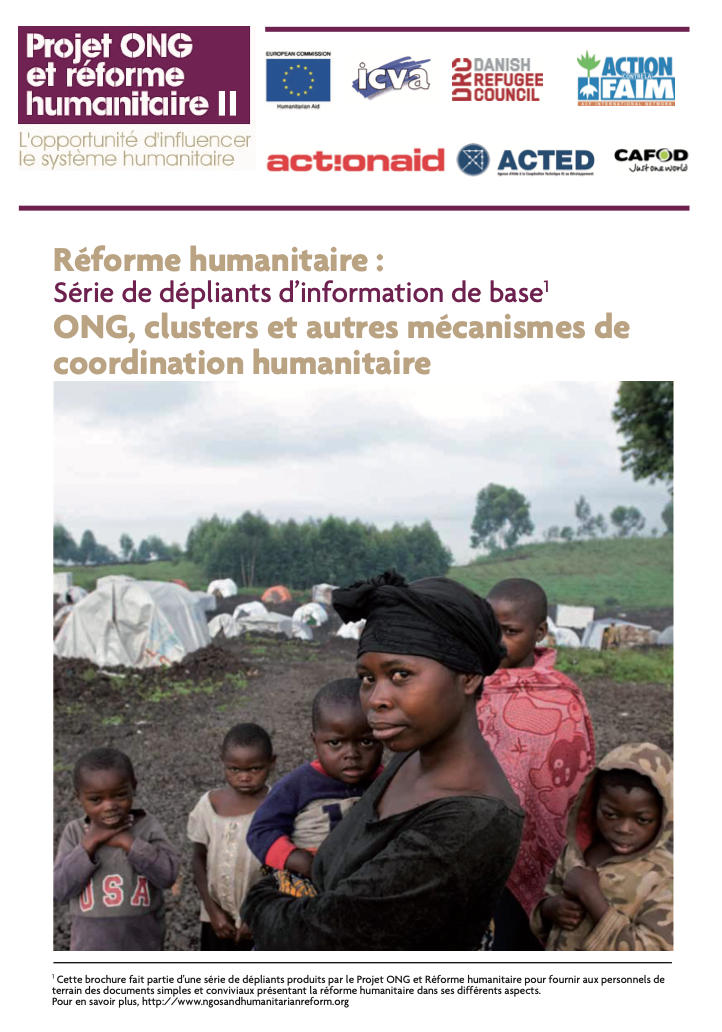
A basic information leaflet series for the NGOs and Humanitarian Reform Project Phase II.
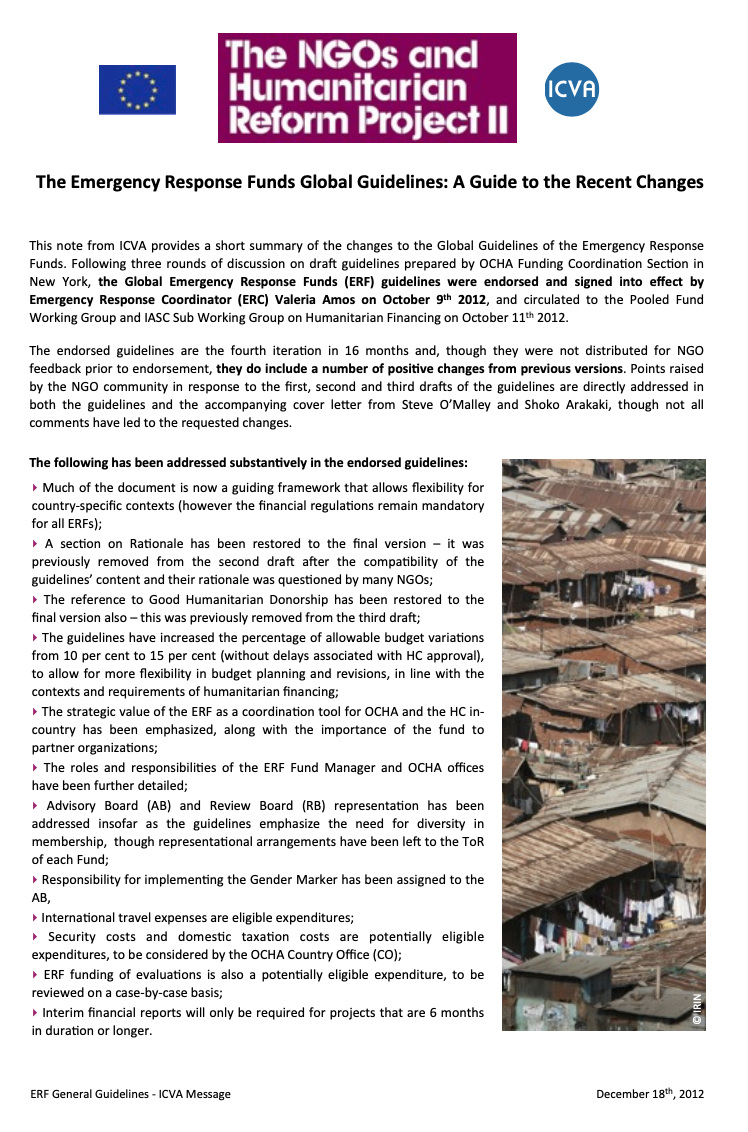
This note from ICVA provides a short summary of the changes to the Global Guidelines of the Emergency Response Funds.
Document part of NGOs and Humanitarian Reform Project Phase II.